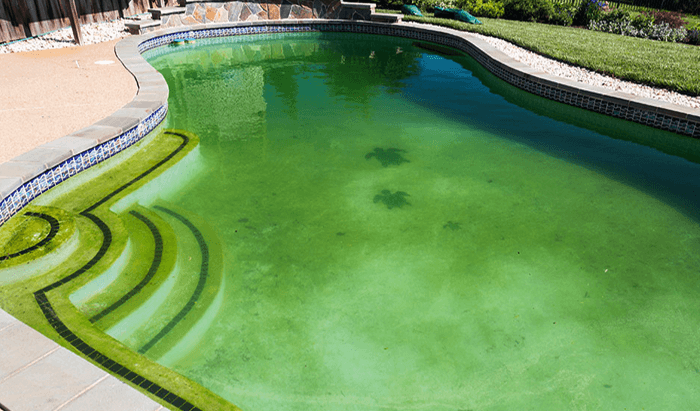Every pool owner has the same desire; keeping their pool perfectly clean. Whether your pool is large or small, it will take high maintenance to keep it pristine. Nothing is more unappealing than a pool filled with dirt and algae.
If you are here, you most likely need help getting rid of the algae in your pool. While pool vacuums are very effective in removing that algae, they are also costly. If you own a small pool, then investing in such an expensive thing might not be wise.
Luckily, there are other ways to remove the algae from your pool and keep it clean. If you want to know how to do this without a pool vacuum, this article is for you. Make sure to read until the end.

Why Keep Your Pool Clean?
People do not clean their pool often because they think the pool is small or because they do not regularly use it. However, I can assure you that this idea is wrong. Some people do not often clean their pool because they think the pool is small or because they do not regularly use it.
You may think to yourself that your pool looks fine, so you do not have to clean it. That is the first mistake pool owners make that leads to algae growing in a pool. Cleaning is a vital part of owning a pool.
Algae are microscopic creatures that you can not see with your bare eyes. Even if it seems clean, pools always contain traces of algae. If these are not removed, then the algae multiply rapidly and soon spread over the pool’s surface.
If you have a pool in your house, you have no other option than to keep it clean. Algae build-up is very bad news for a pool owner. Removing that algae are a very difficult job, especially if you have not cleaned your pool for a while. The longer you leave it unattended, the greater the algal bloom.
Additionally, algal growth in your pool is extremely unhygienic for you and your family. Not only does it make your pool look loathsome, but it can also cause health issues. No one would like to take a dip in a pool filled with algae.
Signs Of Algae Appearing In Your Pool
Like I mentioned earlier, algae traces are always present in your pool. Although these are harmless at first, the algae can grow very fast. If you are new to facing algae in your pool, you may not properly understand the signs of algae appearance.
Thankfully for us, algae can be very easily identified. Initially, the pool water gets slightly cloudy. Over time, your pool will start to get dull as the color fades. In extreme cases, the water starts to appear greenish along with the pool’s walls and stairs.
Read More
How to Clean a Green Above Ground Pool
Best Leaf Canister for Pool Vacuum
How to Start Up a Pool for the First Time
Best Above Ground Pool Vacuum
Before Cleaning Out The Algae
Before we dive into removing the algae, there are some things we need to keep in check.
Cleaning Your Filter
A pool filter is a vital part of your pool, especially if you do not have a vacuum. The filter is essential in removing the algae and debris from your pool water. To ensure that it is working properly, you need to clean your filter after it has been used.
While cleaning the filter, turn it off and brush the sides to remove any algae or dirt present. If there is a lot of dirt collected, spray it with a strong gush of water using a garden hose. Remember to clean the filter before cleaning the water.
Using And Cleaning The Pool Pump
The pool pump regulates the water flow in a pool. It is important to keep your water moving. The pump cleans the flowing water and replaces it.
Many people choose to keep their pool pumps turned off as they find it unnecessary. This is one of the biggest mistakes you can make. Algae grow in stagnant water. By using your water pump, you can make sure that the water is in proper circulation so that the algae can not sit.
The pump itself can get clogged over time. It is wise to take it out of the pool and give it a good wash.
Testing Water Chemicals
Maintaining water pH and alkalinity levels of your pool is crucial. Before adding chemicals or pool treatment, it is important to ensure that the pH levels are optimum. This helps the chemicals to work effectively.
Inspection
Most people know that a pool with poor maintenance can grow algae. However, it’s possible for algae to form even in pools maintained with the best chemicals and other procedures. There are many things that can cause algae to form in a pool, including poor ventilation, high levels of chlorine, and too much sunlight.
There are several steps you can take to keep your pool free of algae.
- Check the filter regularly to ensure it’s working properly.
- Make sure there is enough water circulation in your pool to keep it clean and clear of debris.
- Be sure to test the water frequently so you can adjust the chemicals as needed.
Removing Algae
Algaecides
Algaecides are the most effective way to cut down the algae in your pool. It is a smart alternative to a vacuum. You will come across multiple options of algaecides. Each of these is designed for different types of algae. Before using algaecides, you should identify the type of algae in your pool and act accordingly.
At first, run your pool pump to keep the water circulating. Add algaecides depending on your water levels. Run the pool filter for at least 12 hours.
Shock Product
This method makes use of Calcium Hypochlorite. It is also a very effective and inexpensive method of removing algae. You will need eyewear, hand gloves, a bucket, and Calcium Hypochlorite.
Wear eyewear and gloves for safety. Fill the bucket with regular water. Add one pound shock and mix it properly. Apply it to affected areas and let it stay overnight.
A flocculent can be used afterwards for a finishing touch. This will remove any remaining spores that may not have been removed after the shock.
A Few Thoughts
A pool is susceptible to algae, debris, and dirt if they are not well maintained. As a responsible pool owner, it is your duty to keep your pool in great shape.
That is basically it for this article. In this, I have covered everything you need to know about algae and how to remove them. The information is in great detail, so I believe you will not face any trouble.
